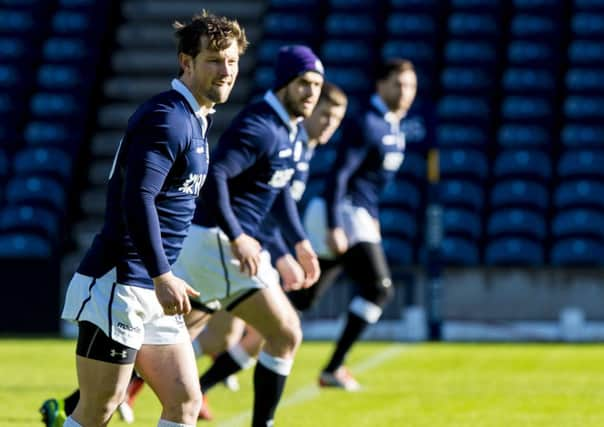Six Nations: Defeat unthinkable for Scotland


There will be no complacency, and, in the wake of that previous pair of games, any sort of win will be deemed to constitute progress: but there is also an understated belief within the camp that this team is very close to putting in an exceptional performance.
Of course, Vern Cotter’s plans have been disrupted. The suspension of Finn Russell is a blow, and the injury list remains uncomfortably lengthy. But of the four changes made by the head coach to his starting 15, two see the return of players who are first picks, so there is no feeling that this is in any sense a second-string Scotland side.
Advertisement
Hide AdAdvertisement
Hide AdThe return of Tommy Seymour on the wing and Euan Murray in the front row after injury and unavailability respectively could be crucial. Seymour has a versatility that Tim Visser lacks, while Murray remains our best tighthead prop.


Behind Murray, Tim Swinson lacks Richie Gray’s dominant presence in the lineout and rampaging menace in the loose. But compared to Jim Hamilton, who would have taken Gray’s place in the second row but for injury, he is more dependable, because less volatile. After conceding yellow cards in their last two games, Scotland can afford to sacrifice a little dynamism if it means keeping 15 men on the pitch throughout.
Then there is Peter Horne, who is making his home debut in his seventh Test, and is starting at stand-off for the first time. Russell’s deputy at Glasgow, Horne will be under intense scrutiny when he takes on the same role at national level at BT Murrayfield this afternoon, and he will be hard pressed to perform as well in defence as his somewhat burlier team-mate.
Yet, having said that, it would be foolish to regard the 25-year-old as some sort of callow stand-in for a man who is three years younger and who showed against Wales that he is far from the finished article when it comes to making correct decisions under pressure. And, as assistant coach Duncan Hodge explained yesterday, the game plan is designed for the whole team, not just one man. Horne will not be asked to behave as if he were a clone of Russell, although he will, by and large, be tasked with playing in a similar way.
“Peter has been in camp the last month, he was with us in the autumn, there’s a bit of consistency there,” said Hodge, himself a former international stand-off. “We have a week to prepare, so we can’t go ripping up everything because of just one player.
“He has fitted in seamlessly. There are no issues there.
“We respect people are individuals and have strengths and weaknesses, and that’s part of our job as well as coaches to factor that in. It is a big game for him, his first Test start at 10 and at home, so he needs to do what he does: do the simple things really well and push everyone else around the pitch.
“It’s always the same there. You’re a pivotal guy and there are things expected of you, but that’s part and parcel of Pete’s make-up. He has no issues taking that on board. He is prepared to accept responsibility.
“He won’t get it perfect on Saturday – if he does, fair play to him, but I expect a mistake or two in there. But that’s not important. It’s how you react and how the guys around him help him out.”
Advertisement
Hide AdAdvertisement
Hide AdWhen the team was announced on Thursday, Horne was at pains to point out that a vital part of his job is to bring into play the talented backs outside him, and to suggest that he would not “set the heather on fire” himself. But Hodge, who was similarly modest as a player, suggested that, while getting the basics right was the priority, Horne also had the ability to make things happen on his own.
“In that position you have a certain role. There’s two or three guys in a team, depending on how many leaders you have, who you’re looking to – 8s, 9s, 10s – who push people around the pitch. Just naturally you look to 10 for guidance; it’s a big part of the role. Everyone’s different, but Pete is an effervescent character and that’s what he does. He’s confident.
“It’s a transition from playing most of his rugby at 12. Most of the skillsets are the same and a big thing for him will be seeing that picture, seeing how the game unfolds, and he’s got the skills to react.
“He’s got a very good skill set. Depending what you want from a 10, he ticks most of those boxes. The unfortunate thing for him in the last two years is he hasn’t played 10 because of Finn and Duncan [Weir]. It’s been great for him to have [played there] the last two weeks [for Glasgow].”
Gregor Townsend, Horne’s coach at the Warriors and another former stand-off, said he had every confidence that the new playmaker would rise to the occasion. “Peter has made a huge effort to improve his game,” Townsend said yesterday. “He’ll inject tempo for Scotland and he has an attacking mind set, is a very good passer of the ball and has many layers to his game.
“I think one facet of his play that he is not given a lot of credit for is that he clears an awful lot of rucks for us. In our last two games at Glasgow, Peter has been outstanding and has played at the top of his game. This is a chance he has been relishing and I’m sure he’ll make the most of it.”
The game is about far more than Horne, of course, and there would be no point in the stand-off excelling himself if the rest of the team under-performed. But, while the last two results have been disappointing, it is clear from those games and from the three Autumn Tests that Scotland are now playing a consistently better game than they were a year ago.
However, as Hodge added, it is just as clear that they need to improve in certain parts of the game. For a start, the discipline has to be better – 12 penalties against the French was bad, and the 13 conceded against Wales did not become a big issue only because the Welsh gave away even more.
Advertisement
Hide AdAdvertisement
Hide AdThe decision-making has to be better too, above all, when the team have multi-phase possession within metres of the opposition line. Try-scoring chances are infrequent at this level. When they present themselves, they have to be taken.
“We need to play our part, start well and cut out some of the errors from the last two weeks,” the assistant coach said. “The teams we played, in my opinion, have had it slightly too easy – penalties, the odd knock-on, Wales re-gathering possession on kicks. They’ve created pressure on us without doing masses themselves and that’s what we have to change.”
Whatever gallantry the Italians achieve in other games – and the three tries they scored at Twickenham a couple of weeks ago constitute proof of their threat – this is the match by which they will measure their own progress. Beat Scotland and their Six Nations season can be deemed a success.
Lose to Italy, conversely, and Scotland’s season will be in crisis, their progress painfully halted. To avoid such a fate they will need to play well from first minute to last, and if they do, they have the strength to prevail in the latter stages of what should be a tight, tense but ultimately rewarding contest.
FOLLOW US
SCOTSMAN TABLET AND MOBILE APPS